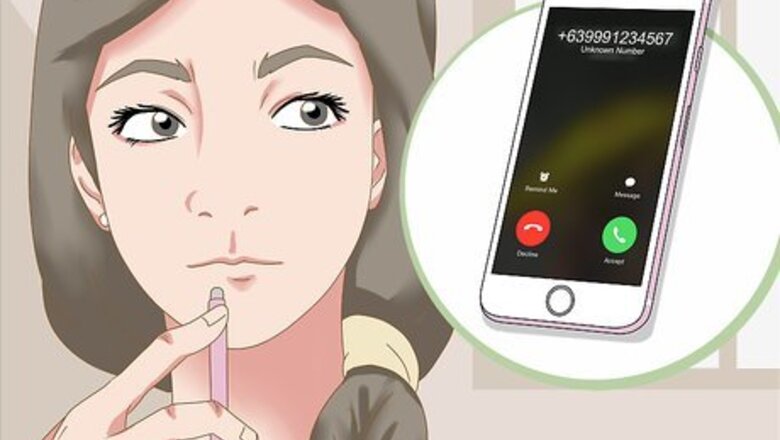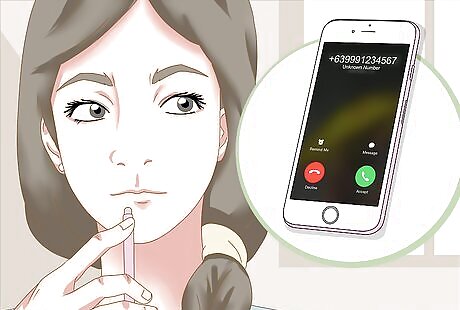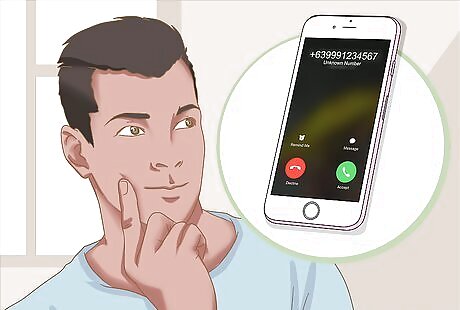
views
Recognizing the Signs of a Smart Phone Addiction

Identify signs of a possible addiction. Every individual with a cell phone looks for notifications of email, messages, “likes” on social media, or missed calls. But what may seem like harmless checking may be a bigger problem, especially if you peek at your smartphone every couple of minutes. Asking yourself the following questions may help you realize that you have an addiction: Have I been pulled over for texting and driving? Do I use red lights to answer social media posts? Do people tell me to get off of my phone and pay attention to them? Do I use my smartphone at inappropriate times, such as at doctor's appointments or meetings with my kid's teacher? Is my smart phone always in my hand or close by? Does my battery last through the day? Does the smart phone join me in the bathroom. Do I use my smart phone in social situations, such as dinners with colleagues? Is my smartphone use causing considerable problems in my life such as legal issues, falling grades, or isolation from loved ones? Does it take me much longer to complete tasks now because I'm checking my cell phone repeatedly? Have I found it difficult to make conversation with people face-to-face?

Notice symptoms of addiction. Any type of addiction often comes with symptoms. This is also true for smartphone addiction. Noticing if you have any signs or symptoms can help you know if you are addicted to the device. Some symptoms of smartphone addiction include: Panic attacks when you leave or forget your smartphone somewhere Feeling false vibrations from the phone Increased stress throughout your body Insomnia Anxiety, especially from waiting for messages or alerts Depression Aggression Diminished ability to think or be creative Fear of missing out on something Eye strain Blurred vision Neck pain Pain or mobility problems in your wrist or forearm Headaches Fatigue

Watch for signs of withdrawal. Another hallmark of addiction is withdrawal when you try and cut back, or repeated failed attempts to cut back. Watching for the signs of withdrawal when you don't use your cell phone can help you know if you're addicted. The following are signs of smartphone withdrawal: Restlessness Anger Irritability Difficulty concentrating Sleeping problems Craving access to your smartphone
Tracking Your Smartphone Use

Keep a journal of smartphone use. You may find it difficult to ask yourself questions about your smartphone use. You might even forget every now and then. Keeping track of when you reach for or use your smartphone can help you figure out if you have a problem. This can be the first step in controlling your addiction. Write a note or make a symbol in a notebook any time you pick up your smartphone. Download one of the many new apps that actually track your smartphone use. Apps such as BreakFree and Moment automatically track your smartphone use. Such sites also allow you to track progress you make with your addiction. Look at your social media accounts, which often indicate the last time you logged in. If it was only a few minutes prior, you may be addicted. Consider the question, “Do I always look for how many people liked and commented on my post?” You ma also consider if you do this in other areas of your life. Try asking yourself, "Are there other things that I do as frequently?" and "How does time spent on my smartphone measure up to time I spend working, with my children, or doing other activities?"

Detect patterns of smartphone use. If you've recognized considerable smartphone use, it's important to know why. Figuring out specific situations that make you reach for your device can help you remove yourself from them or stop using your smartphone during these times. You can use an app that tracks your use to detect patterns or do it yourself. Ask yourself the following questions to recognize patterns of use: When do I reach for my phone? Is there some reason in particular I reach for my phone? Is it boredom? Stress? Anxiety? Or another underlying issue? Do I pick up my smartphone because other people are picking up theirs? Have I been addicted to other behaviors, items, or substances in the past?

See how others react to your smartphone use. How others respond when you reach for your phone can be a great indicator of an addiction. Listen to what others say or do with their bodies to cue you into a potential problem. Look at how people react when you reach for your phone. Do they roll their eyes or sigh? Body language such as crossing arms, huffing or sighing, looking at anything but you, turning away from you, rubbing their faces in exasperation, or giving you “death stares” may indicate that people think you have a problem. Listen to what people say when your reach for your phone. If a friend says, “Come on, Teddy, focus on me,” or “Can't you put that thing down for one minute,” the person may be subliminally telling you that you have a smartphone addiction. Watch people's body language when you are in a group and the center of attention.

Consult with family and friends. If you've recognized typical signs of a smartphone addiction but are still unsure, talk to a trusted family member or friend. Open up about your concerns and ask if the person has noticed any potential problems with your smartphone use. The answer may be painful to hear, but someone who cares for you will give you an opinion in a way that won't hurt your feelings. The person may even help you curb an addiction. Ask family members if your behavior is related to something such as tension in the family. Approach the question gently. For example, “Hey Al, I think I may be addicted to my smartphone. I'm wondering if it's because of it distracts me from all of the problems with mom. Have you noticed any problems with my smartphone use? Could we spend some time talking about it?” Understand that it is hard to ask someone about your smartphone addiction. Sometimes, the person may be reluctant to answer. Approach the situation delicately. Say, “Callie, I need your opinion. I think I have an addiction to my smartphone. Do you think I do? Please be honest. I know it's hard, but I really value your opinion. I know what you say comes from the heart.” You may also want to ask friend and family if they have noticed a decline in your real-life relationships or social skills due to your smartphone use. Ask them to provide you with examples of anything they have noticed.

















Comments
0 comment